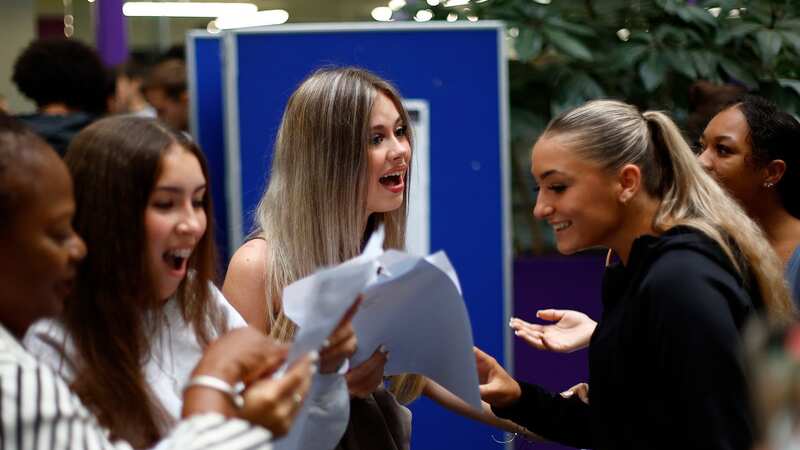GCSE results show North-South divide as Tory levelling up vow 'dead and buried'

The number of pupils getting top GCSE grades has fallen as results laid bare the stark North-South divide in England.
UK figures showed 22% of GCSE entries were awarded 7/A or above - a 4.3 percentage point drop from last year (26.3%), after efforts to return grading to pre-pandemic levels. Results remained higher than in 2019 (20.8%) before Covid-19 caused massive disruption to schooling. Overall, 68.2% of entries received a 4/C grade or above - down from 73.2% last year, but higher than 67.3% in 2019.
But the figures reveal a major gap in top grades across England. Just 17.6% of teenagers in the North East received 7/A or above, compared to 28.4% in London - a 10.8 percentage point gap. The gap between the North East and the capital was 10.2 percentage points last year - and it has increased every year since 2017. In Yorkshire and Humber 18.3% of pupils got top marks, rising to 18.4% in the West Midlands and 18.5% in the East Midlands. In the South East it was 24.4%.
The gap between children from richer and poorer households remains persistent, with 46.6% of private school kids attaining top marks, compared to 19.1% in comprehensive schools. Schools Minister Nick Gibb was forced to admit that progress on helping poorer pupils get better grades has stalled, saying the pandemic had "undone" progress to close the attainment gap.
Shadow Education Secretary Bridget Phillipson said the results show Tory promises to level up education are "dead and buried".
 Nursery apologises after child with Down's syndrome ‘treated less favourably’
Nursery apologises after child with Down's syndrome ‘treated less favourably’
Failure to invest in catch up for students who missed out on lessons during the pandemic was partly blamed for the disparities in achievement. Chris Zarraga, director of Schools North East, said: "GCSE results this year highlight the hard work and dedication of school staff in delivering 'catch-up' support to students. This support is vital in improving the opportunities for young people in our region. However, it is clear that significant challenges remain, with education recovery policies too London-centric." He warned the gap risks widening further if the policy continues to be 'one size fits all'.
Henri Murison, Chief Executive of the Northern Powerhouse Partnership, said the pandemic had only deepened inequalities across the country. "Regional disparities in education outcomes have historically been driven by disadvantage and we are concerned that this may have persisted post pandemic," he said. "The government was right to extend pupil premium funding to 16-18 year old care leavers in some local authorities but we now need to extend this to all disadvantaged children in the worst-affected areas."
Lee Elliot Major, professor of social mobility at the University of Exeter, the education playing field was becoming more unequal across the country. He said: "It is simply unacceptable that where someone is born should have such a big impact on their educational and life prospects."
Geoff Barton, General Secretary of the Association of School and College Leaders (ASCL), said young people from disadvantaged backgrounds had suffered a disproportionate hit from the pandemic and the cost-of-living crisis. He said: "It is likely that the outcomes for many of these young people will be affected by these factors and this may also impact on the results of schools which serve disadvantaged communities. The Government has failed to grasp the gravity of this issue."
Mr Gibb told BBC Breakfast: "We did achieve a 9% closing of that gap for secondary and we closed the gap by 13% for primary, but that has been undone, as you say, by Covid, and now we need to get back to normality. We've got the recovery programme happening in our schools right now. And then we need to get back to the reform programme to make sure that we can continue to close that gap."
* Follow Mirror Politics on Snapchat, Tiktok, Twitter and Facebook.
Read more similar news:
Comments:
comments powered by Disqus

































